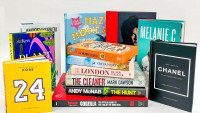
Could an A.I. Chatbot Rewrite My Novel?
newyorker.com – Saturday December 10, 2022

During one of my more desperate phases as a young novelist, I began to question whether I should actually be writing my own stories. I was deeply uninterested at the time in anything that resembled a plot, but I acknowledged that if I wanted to attain any sort of literary success I would need to tell a story that had a distinct beginning, middle, and end.
This was about twenty years ago. My graduate-school friends and I were obsessed with a Web site called the Postmodernism Generator that spat out nonsensical but hilarious critical-theory papers. The site, which was created by a coder named Andrew C. Bulhak, who was building off Jamie Zawinski’s Dada Engine, is still up today, and generates fake scholarly writing that reads like, “In the works of Tarantino, a predominant concept is the distinction between creation and destruction. Marx’s essay on capitalist socialism holds that society has objective value. But an abundance of appropriations concerning not theory, but subtheory exist.”
I figured that, if a bit of code could spit out an academic paper, it could probably just tell me what to write about. Most plots, I knew, followed very simple rules, and, because I couldn’t quite figure out how to string one of these out, I began talking to some computer-science graduate students about the possibilities of creating a bot that could just tell me who should go where, and what should happen to them. What I imagined was a simple text box in which I could type in a beginning—something like “A man and his dog arrive in a small town in Indiana”—and then the bot would just tell me that, on page 3, after six paragraphs of my beautiful descriptions and taut prose, the dog would find a mysterious set of bones in the back yard of their boarding house.
After a couple months of digging around, it became clear to me that I wasn’t going to find much backing for my plan. One of the computer-science students, as I recall, accused me of trying to strip everything good, original, and beautiful from the creative process. Bots, he argued, could imitate basic writing and would improve at that task, but A.I. could never tell you the way Karenin smiled, nor would it ever fixate on all the place names that filled Proust’s childhood. I understood why he felt that way, and agreed to a certain extent. But I didn’t see why a bot couldn’t just fill in all the parts where someone walks from point A to point B.

Markus Dohle Steps Down as Penguin Random House CEO
publishersweekly.com – Saturday December 10, 2022

Penguin Random House CEO Markus Dohle has relinquished his position at the head of the publisher, just weeks after a federal judge blocked the publisher’s attempt to acquire rival Big Five publisher Simon & Schuster. In a December 9 announcement, officials at PRH parent company Bertelsmann said Dohle will step down as CEO and resign his seat on the Bertelsmann executive board at the end of 2022 “at his own request and on the best of mutual terms,” though he will continue to serve in an undefined “advisory" role.
“Following the antitrust decision in the U.S. against the merger of Penguin Random House and Simon & Schuster, I have decided, after nearly 15 years on the Executive Board of Bertelsmann and at the helm of our global publishing business, to hand over the next chapter of Penguin Random House to new leadership,” Dohle said in a statement. “I have led our global book business with great enthusiasm and passion and I am proud of what we have achieved together.”

Sam Lipsyte on the What and the How of Writing
lithub.com – Friday December 9, 2022

Content and style are not separate things. They are different aspects—the what and the how—of the same thing. By the how I mean the way certain syntactical arrangements of words set off chains of thought and emotion and even physical sensation in the reader, create a kind of energy field within which one experiences the text. By the what I just mean whatever somebody is writing about: love, work, art, war, school, politics, sex, faith, family, death. Life, basically, life with others and life alone, the end of life. This is the content. Style is your filter on all of this, the way you see it and feel it— tragically, tragicomically—and how it summons language in you, how life comes to be alive on the page.

Literary agent Gregory to retire at the end of the year
thebookseller.com – Thursday December 8, 2022

Literary agent Jane Gregory has announced she is retiring at the end of the year.
She told industry colleagues: “The day has come at last when I retire from agenting and move on the next stage of my life, which I hope and expect to involve a great deal of fun, travel, getting up late, burning the midnight oil, writing ‘disgusted of Deal’ letters, extending my sea swimming season from May to September into the autumn..., reducing my ‘to be read’ pile of books, ‘spending more time with my family’ and I am sure that there are other things out there…”

Creative Writing Prompts to Get Your Brain in Gear
rismedia.com – Tuesday December 6, 2022

Writing is an easy way to escape reality and enter into a world of your own. Unfortunately, writer’s block is a nasty beast that loves to rear its ugly head at the most inopportune moments. Inspiration is undoubtedly the most effective weapon against this monster. Explore these five creative writing prompts to get your imagination moving and your pen flying across the paper.

Print on demand pays off
thebookseller.com – Tuesday December 6, 2022

When I founded Mensch Publishing, I determined to use the business to test out different ways of doing things. At an author level my terms involved zero advances, world rights all languages, and a relatively high net receipts royalty. Most of the books I have published are brilliantly supported by the Bloomsbury salesforce worldwide and by using their excellent production and rights departments.
But I wanted to try an experiment using print-on-demand technology for an out-and-out trade book with the author’s and agent’s permission. The book in question is Philip Norman’s wonderful memoir of Fleet Street high jinks and catastrophes, We Danced on Our Desks, which we are publishing in original paperback and e-book on 12th December.

New Publisher Listing: LW Books
firstwriter.com – Tuesday December 6, 2022

Specialized books with price guides for collectibles, especially ceramics.

Hachette UK acquires Welbeck Publishing Group
thebookseller.com – Monday December 5, 2022

Hachette UK has acquired independent Welbeck Publishing Group for an undisclosed sum, with an agreement made between the shareholders of Welbeck and Hachette UK on 30th November 2022.
Welbeck’s gift, illustrated and adult trade publishing will become part of Headline Publishing Group and Welbeck’s children’s list will become part of Hachette Children’s Group.
Hachette UK says the acquisition of Welbeck is part of its longer-term strategy to diversify into specialist areas by acquiring publishers that are “leaders in their field”; in recent years its acquisitions have included Paperblanks, Bookouture, Jessica Kingsley Publishers, Laurence King, Summersdale, John Catt Educational and Short Books.

New Literary Agent Listing: Stephanie Stevens
firstwriter.com – Monday December 5, 2022

Loves working with mystery, thriller, women's fiction, and romance authors especially when the story involves an unexpected twist.

AI Reveals the Most Human Parts of Writing
wired.com – Friday December 2, 2022

A WOMAN HAS been working on her book, a young adult fantasy novel, for hours. At some point, she gets the familiar itch to check her email: She can’t think of what to write next. She stares at the screen. She’s lost her words. She could bang her head against the wall, or maybe turn to a favorite book for inspiration, or lose her momentum to distraction. But instead she turns to an AI writing tool, which takes in her chapter so far and spits out some potential next paragraphs. These paragraphs are never quite what she wants, though they sometimes contain beautiful sentences or fascinating directions. (Once it suggested a character sings a song, and also generated the lyrics of the song.) Even when these paragraphs fail, they make her interested in the story again. She’s curious about this computer-generated text, and it reignites her interest in her own writing.
Get the free newsletter | Submit a news item or article | Get Writers' News for your website





